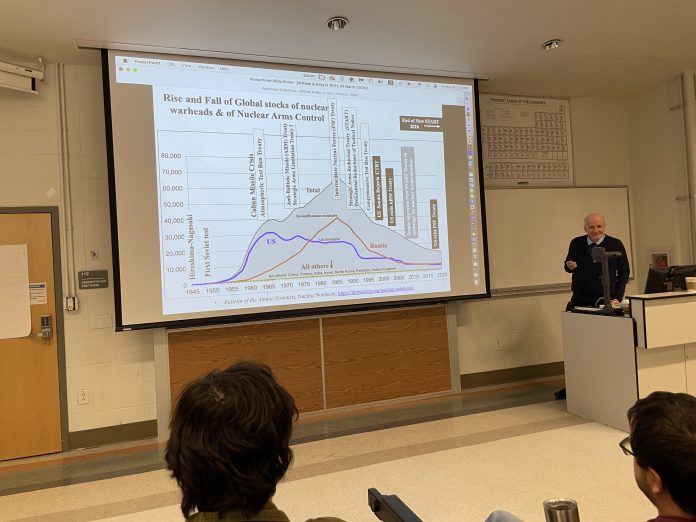Friday, March 29, the College’s department of physics welcomed Frank N. von Hippel, a senior research physicist and professor of public and international affairs emeritus from Princeton’s Program on Science and Global Security, to deliver a colloquium in Small Hall on the contemporary discourse surrounding nuclear warfare. Von Hippel came on behalf of the Physicists Coalition for Nuclear Threat Reduction, which he co-founded in 2019. In his talk, titled, “Danger of nuclear war! Physicists (and all scientists and engineers) can help!” he emphasized the continued relevance of the nuclear arms race and appealed for the support of scientists and students in fostering a safer world.
The College’s professor of physics Marc Sher organized the colloquium and expressed his gratitude for von Hippel’s initiative in reaching out to speak at the event.
“I’m in charge of the Colloquium Committee,” Sher said. “So they sent the email to me and I said ‘Yeah, that’d be great, I’ve even heard of Frank von Hippel. I haven’t met him, but I know of him. In fact, we have many, many mutual friends. My mentor worked with Frank.’”
Many of the talk’s attendees came directly from the undergraduate-graduate physics student mixer held before. Ben Spaude, a first-year graduate student, shared his interest in nuclear physics and disarmament efforts.
“I came to the Colloquium, mostly because I have a large interest in nuclear physics, and nuclear weapons is something that kind of interests me and how we distribute them and try to remove them as well,” Spaude said.
Sophie Strauss ’25, an undergraduate physics major, was intrigued by von Hippel’s unconventional career shift given her own aspirations to potentially work in science policy.
“I’ve just been thinking it might be cool to work at the OSTP, the Office of Science and Technology Policy, in the White House, and I was just wondering about how professor von Hippel switched from a physicist to being in policy.”
According to Nuclear Princeton, von Hippel has been involved in nuclear weapon science and public policy for the past 50 years. His career shift, from professor of physics at Stanford to policy activism based in Princeton, came about after witnessing the power of student activism during protests against the Vietnam war.
Since then, von Hippel’s endeavors have included including collaborating with former-Soviet leader Mikhail Gorbachev in the 1980s to advocate for a Comprehensive Test Ban, serving as assistant director for national security in the White House Office of Science and Technology Policy during the Clinton administration and co-founding the nongovernmental International Panel on Fissile Materials in 2006, among other accolades.
Von Hippel commenced his presentation by providing context on the current nuclear arms race, highlighting the dominant roles of the United States and Russia since the bombing of Hiroshima to now. He additionally pointed out the emerging involvement of China, moving the race from a two-body to a three-body problem.
Further, von Hippel debunked a belief that the threat of nuclear warfare ceased with the Cold War and underscored the ongoing modernization of nuclear weapons in the United States, which indicates a still-looming threat of war.
“So, we are also at this point going through a modernization cycle,” von Hippel said. “It was a big build-up we saw during the Kennedy-Eisenhower period, and there was a big cycle of modernization during the Reagan administration. And then, there is currently a cycle of replacing all of our strategic nuclear weapons with new ones, and this just shows the budget implications. So, this doesn’t look like the business that is going out. It’s on the way up.”
However, despite being in an era of technological advancements, von Hippel is more concerned with accidental rather than intentional nuclear war.
“What I worry about is actually not intentional nuclear war, but rather accidental nuclear war,” von Hippel said.
With the advancement of nuclear weapon technology allowing faster launches, a choice to “launch on warning,” or to launch nuclear weapons before the other side’s weapons could reach our front, became an option. According to von Hippel, a nuclear weapon from Russia would reach the United States in 30 minutes, leaving little time for the U.S. President to stall or consider a potential false alarm.
“That’s the kind of problem that makes me worry about this launch warning part and there were various false alarms,” von Hippel said. “False alarms are more dangerous in a period of danger of confrontation, like for example, if we were fighting over Taiwan. People would be more inclined to believe that this was a real attack.”
When addressing the repercussions of nuclear war, he asserted that the initial human casualties could reach into the millions, while emphasizing that the environmental devastation would greatly magnify the total death toll. Von Hippel used models to depict the climate and chemical impacts of hypothetical US-Russian warfare.
“The first summer after this hypothetical nuclear war, basically the length of the growing season in the Northern hemisphere, has been reduced to the length of the growing season in Antarctica and really not much food,” von Hippel said.
To conclude the colloquium, von Hippel reiterated his affiliation with the Physicists Coalition for Nuclear Threat Reduction and elaborated on the coalition’s mission. He expressed the coalition’s desire for increased involvement from universities and students.
Many attendees left with a broader understanding of the current arms race with some, like Strauss, experiencing heightened anxiety regarding the real consequences of nuclear weapons. While intrigued, Strauss voiced hesitation about joining a coalition chapter at the College.
“Maybe, I’ll probably end up going on the website and signing up for some email chain and seeing what that involves,” Strauss said. “But, I also have a lot of anxiety about this topic so it kind of depends on how much I can handle it.”
For those further interested in more information on the Physicists Coalition and potential work opportunities, contact Marc Sher at mtsher@wm.edu.

